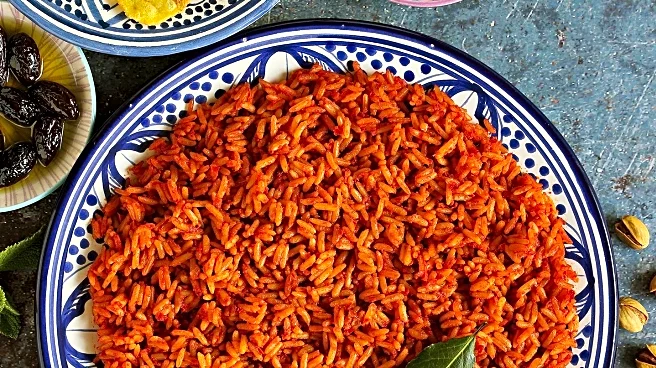What's Happening?
Nigerian chef Hilda Baci has achieved a Guinness World Record by cooking the largest pot of jollof rice, weighing 8,780 kilograms, in Lagos. The event, which took place last week, involved a team of 10 chefs and a custom-made pot capable of holding 23,000 liters. Despite challenges, including the pot buckling during the weigh-in, the record was confirmed by Guinness World Records. Baci's recipe included 4,000 kilograms of rice, 500 cartons of tomato paste, 600 kilograms of onions, and 168 kilograms of goat meat. The dish was divided into portions and distributed to the crowd, marking a significant cultural achievement for Nigeria.
Why It's Important?
This record-setting event highlights Nigeria's cultural heritage and culinary prowess, particularly with jollof rice, a staple in West African cuisine. It underscores the country's ability to unite and achieve significant feats, fostering national pride and international recognition. The event also showcases the power of food to bring communities together, as thousands gathered to witness the record attempt. For Nigeria, this achievement reinforces its status as a cultural leader in Africa, potentially boosting tourism and interest in Nigerian cuisine globally.
What's Next?
Following this achievement, Baci and her team may seek further recognition and opportunities to promote Nigerian cuisine on a global scale. The success could inspire similar cultural events, enhancing Nigeria's culinary reputation. Additionally, the event may encourage other chefs to attempt breaking records, fostering a spirit of competition and innovation in the culinary world. Stakeholders in the tourism and hospitality sectors might leverage this achievement to attract visitors interested in experiencing Nigerian culture firsthand.
Beyond the Headlines
The event raises questions about the role of culinary arts in cultural diplomacy and international relations. It highlights how food can serve as a bridge between cultures, promoting understanding and appreciation. The record also emphasizes the importance of teamwork and community support in achieving large-scale goals, offering lessons in collaboration and perseverance. Furthermore, it may inspire discussions on sustainable practices in large-scale cooking events, considering the resources and logistics involved.









